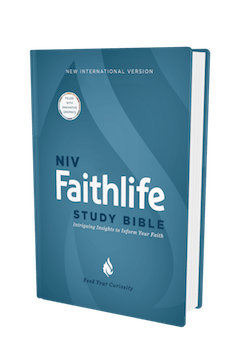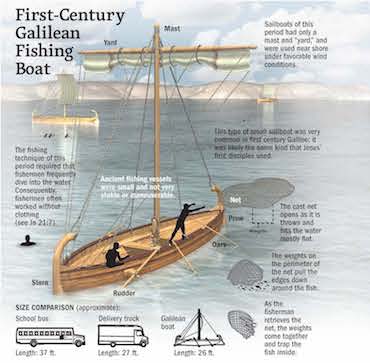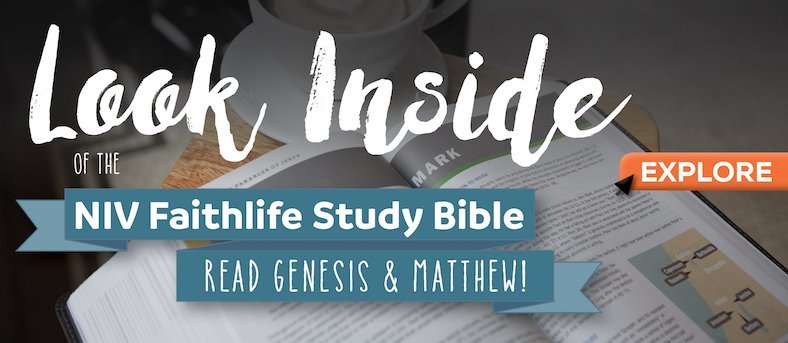This sponsored post was provided by Dr. Michael Bird, Lecturer in Theology and New Testament at Ridley College, on behalf of the NIV Faithlife Study Bible.
The new NIV Faithlife Study Bible, created in partnership with Faithlife Corporation, creators of Logos Bible Software, is now available in print and is full of eye-catching graphics, charts, and timelines built for curious readers. With contributors including Charles Stanley, Randy Alcorn, Ed Stetzer and Lee Strobel, the study Bible presents innovative insights and multiple points of view that feed your curiosity during your personal Bible study.

Dr. Michael Bird sits down to discuss practical ways to further explore the Bible.
Q: How can studying multiple points of view help our bible study?
A: There are several passages in the bible that are tricky. Now, you know as a Protestant, I believe in the clarity of Scripture, but even in the Protestant confessions, no one says that all passages of Scripture are equally clear. If you are going to get a grasp on some of the tricky or hairier passages of the Bible, you need to look at multiple viewpoints.
Let me give you one good example – Romans 7 – the wretched man, the “I” who struggles under the law. Who is being talked about? Is this Paul in his own personal biography? If it is, is it him as a Christian or before he was a Christian? Or is it kind of, like, impersonating Adam? Or is it Israel under the law? How do you decide? There is no one right answer, you’ve got to look at multiple viewpoints in order to make up your mind.
 There are some passages of Scripture that I think you really do need to look outside your own tradition, look outside your own assumptions, look outside your own school. I think you’ll be better for that. Even if you find your own view affirmed, at least you’ll have now more resources to think why that might be correct, or you’ll be challenged to think, ‘On second thought, after considering that, I think this passage,’ like Romans 7, ‘means something else entirely from what I’ve been used to.’
There are some passages of Scripture that I think you really do need to look outside your own tradition, look outside your own assumptions, look outside your own school. I think you’ll be better for that. Even if you find your own view affirmed, at least you’ll have now more resources to think why that might be correct, or you’ll be challenged to think, ‘On second thought, after considering that, I think this passage,’ like Romans 7, ‘means something else entirely from what I’ve been used to.’
It’s important because you don’t want to study the Bible living in an echo chamber where all you hear said to you and taught to you is what you hear all the time. It’s good to bring, I daresay, a little bit of diversity to the gene pool of your own exegesis and Bible study. Because you can really learn, you can really appreciate, and you can become a much fuller Christian by listening to others.
Q: What are some parts of the Bible we often skip over because we think they can’t teach us anything?
A: There are numerous parts of the Bible that are just very easy to look at the text and think, ‘Okay, yeah, nothing much to see there.’

Probably a classic example would be the biblical genealogies. If you look at the genealogies of Matthew’s gospel, you’d think, ‘Okay there is a whole bunch of people before Jesus who are related to Joseph and Mary.’ But it’s interesting in the genealogies of Matthew’s gospel – it mentions four prominent women! People often ask, ‘Why are these women mentioned? Is it because they were all Gentile or non-Jews? Or is it because they all had somewhat irregular sexual unions?’ And you’ve got to think about the significance of that. If you weren’t looking for that, if you’d just glossed over, you’d never even think to look or reflect on that. But if you go a little bit deeper and actually look at who these people are and what they’re remembered for in the history of Israel, you can pick out these sorts of nuggets.
You know, there is a bit of history in Jesus’ own lineage when he was adopted into the family of David – so it does help if you’ve got a resource like the NIV Faithlife Study Bible that can then help you explore this further or at least point out some of these little things that you would otherwise never even notice.
Q: How can charts and people diagrams help people understand Bible stories better?
A: There’s a number of helpful charts and timelines – let me tell you – trying to map the Herodian family is like trying to map out the Kardashians. You’re starting to wonder like, ‘Who’s who?’ and that type of a thing. ‘Where is Abraham in relation to Moses and David? Or, Jehoiachin or Jehoiakim? Who are these people and how do they all fit together?’ So a number of these charts help you hold them all together and give you a basic grasp when you’re reading the Bible. Where are you in Israel’s sacred history or where are you in the New Testament and who are all these people?











